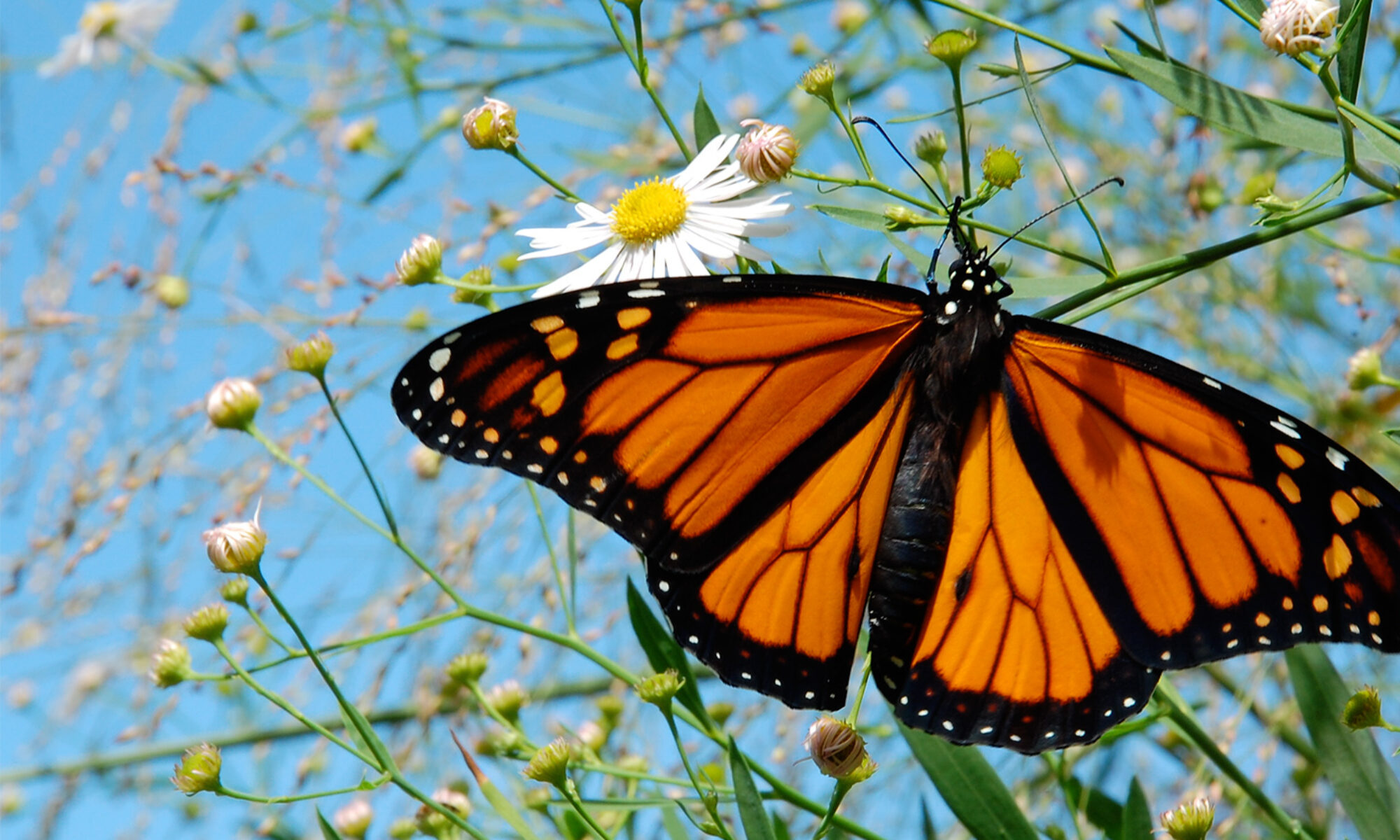People who have been alive long enough may have noticed what is now being called the “Windshield Phenomenon.” When we were young, we frequently had to wipe off dead insects from our car windshield during trips.
This is no longer necessary. Convenient, but alarming!

Insect populations in general are in decline. Many people might think this is a good thing. Don’t we battle insects in our gardens all year? Don’t we worry about insect-transmitted diseases? Who would complain about fewer insects?
But think about how energy from the sun gets distributed throughout the food web. Plants use sunlight to make food and are then eaten by many animals and especially by insects! These insects then are eaten by creatures higher up the food chain and so on. And who’s at the top of this food chain? Humans!
Even if you’re a vegan and eat only plants, you still depend on functioning ecosystems. And ecosystems don’t function without insects, who provide many other services beyond the obvious pollination services.
Besides being food for creatures higher up the food chain and pollinating not only our food plants but also plants in nature, they:
- disperse seeds,
- cycle nutrients,
- eat carrion,
- maintain soil structure and fertility,
- control populations of other organisms,
- and even process dung!
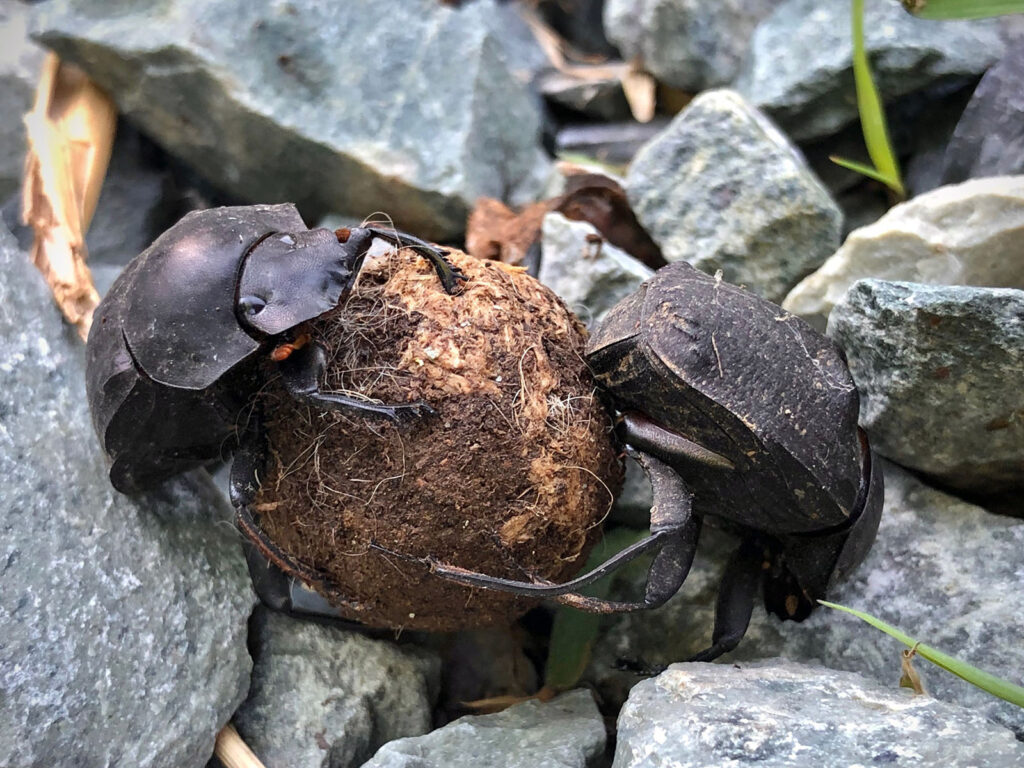
These hard-working dung beetles are removing dung on our son’s land in North Carolina.
Truly an important service!
[Photo: Danielle Ackley]
And it’s important to recognize that many of the most problematic insects have been introduced to our continent, and so they don’t have the usual controls on their activities.
Insects and their contributions are so important that the massive decline in insect populations has been referred to as “Insect Armageddon” or the “Insect Apocalypse.” Whether or not these terms are totally accurate, they convey the importance of insects to life on earth, as well as the danger TO HUMANS if their populations decline.
Here’s how we’re trying to help insects
Insects are the foundation of the food web … and they need native plants to survive. By providing native plants, we’re providing habitat for many insects.
Also important is that we don’t use insecticides or bug zappers. Bug zappers have been shown to be ineffective against mosquitoes anyway (see Resources below).
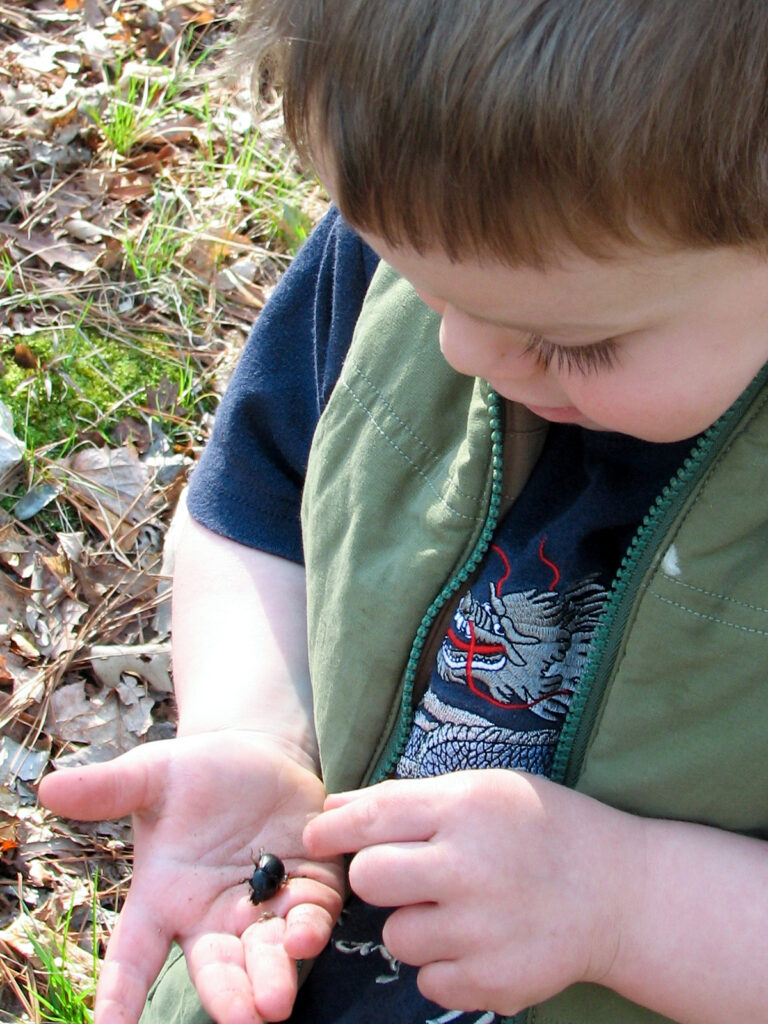
We don’t worry about which are the “bad” ones or the “good” ones. We let them sort it out as they have for millions of years. We do, however, try to eradicate the non-native insects that can harm our native ecosystems (not to mention our plants).
Special insects
We make special efforts for some insects, such as:
- butterflies, and especially monarchs,
- bees and other pollinators, and
- dragonflies.
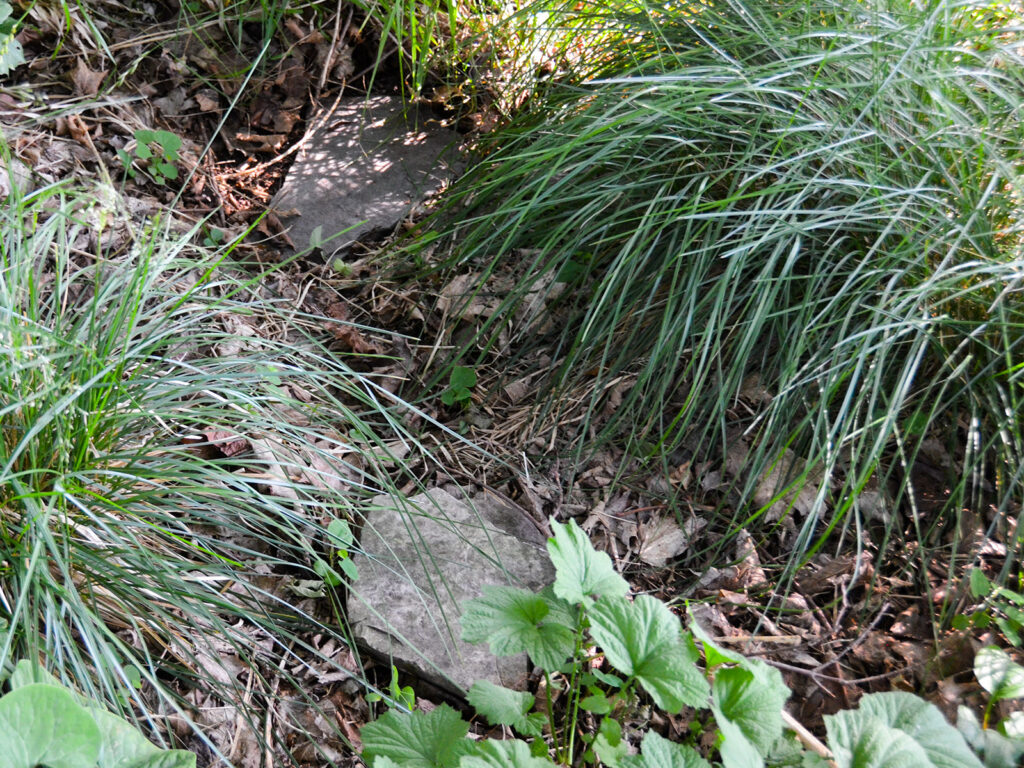
We place stepping stones throughout our planting beds so we don’t have to step directly on the soil. This isn’t intended to be a path, just stones placed closely enough that we can get anywhere in the bed.
Why? Not only does stepping on soil hurt the soil structure, but it could also harm insects, such as fireflies, living in the soil.
Ants are insects, too
Ants play important roles in our habitat garden — and in the world beyond.
One unusual role they play is to help disperse seeds, a process called myrmecochory. (Note that this is dispersal, not pollination.)
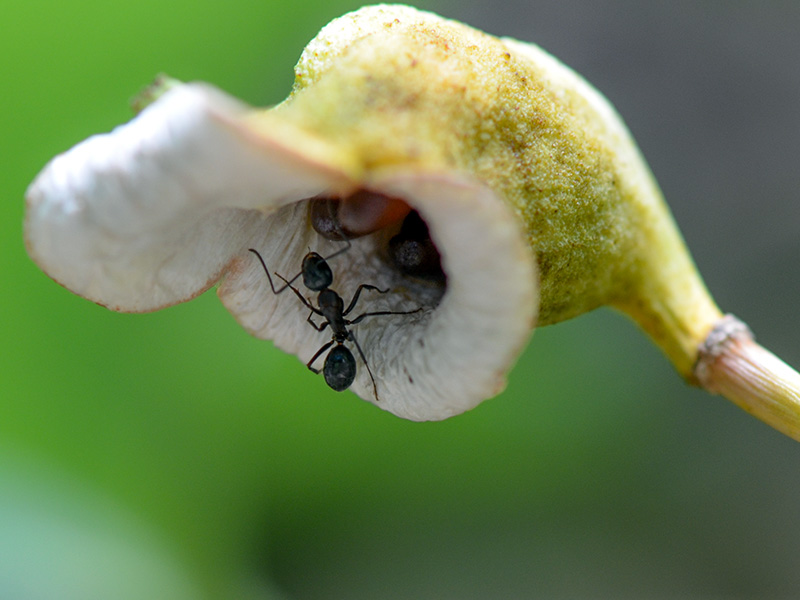
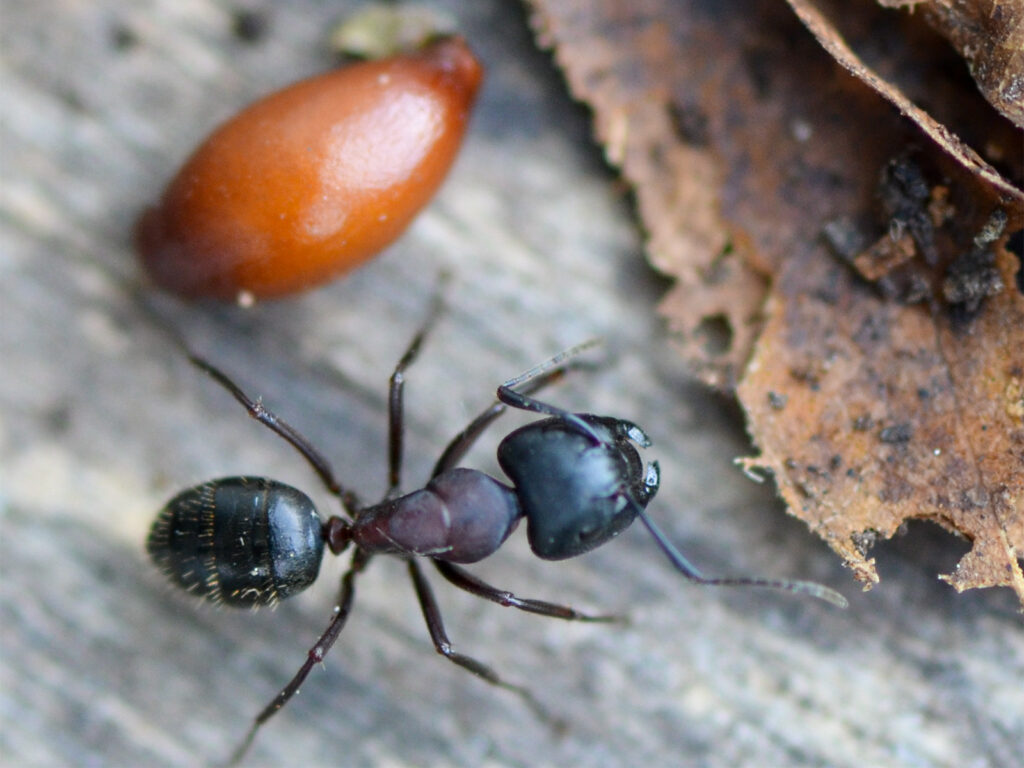
Attracted by the fatty deposit on the seed, they take it home, eat the fat, then discard the seed — exactly what the plant needs to have its seed spread around. A surprising number of plants, such as trillium, rely on ants.
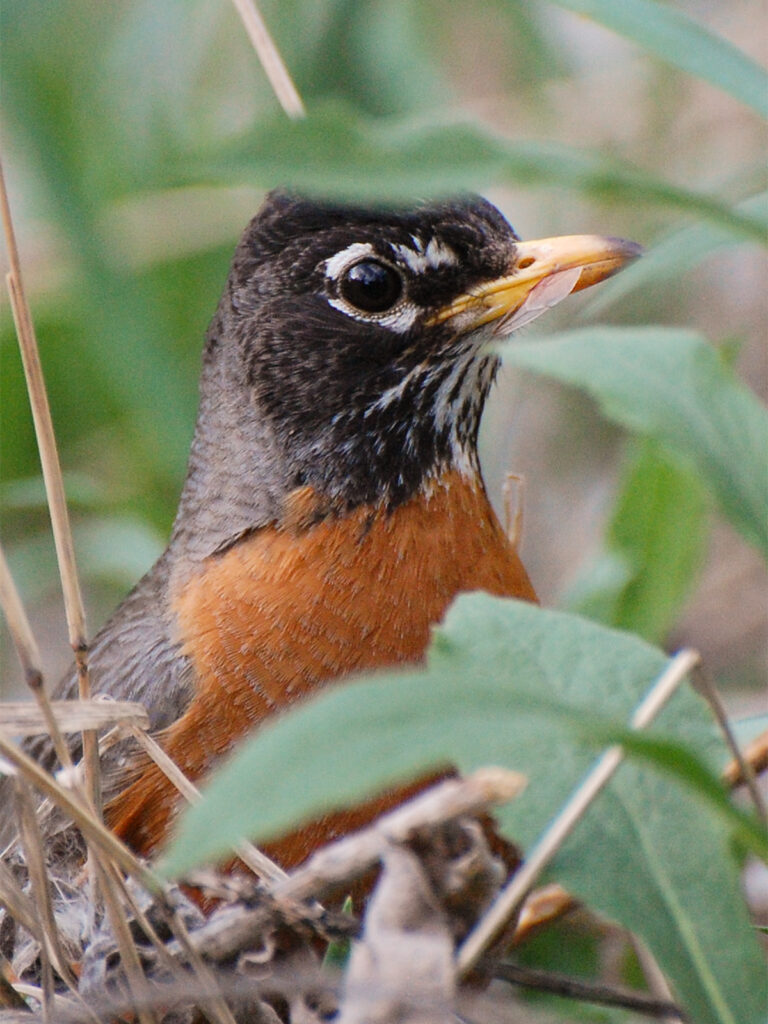
And, of course, ants themselves are tasty food for birds and other creatures.
See the wing in its beak? Some ant queens had been flying around, and this robin took advantage of the treat.
Here are some of the facts the 2022 Proceedings of the National Academy of Science study found:
- A new estimate for the total number of ants: 20 quadrillion individuals — in other words: : 20,000,000,000,000,000, or 20,000 trillion
- The total mass of ants on earth: 12 megatons of dry carbon (a standard way of measuring animals’ biomass). In other words, they outweigh all the wild birds and mammals put together
- For every person, there are about 2.5 million ants
- By tunneling, they aerate soil and drag seeds underground to sprout
- They’re an important source of food for arthropods, birds and mammals
- Without carpenter ants, forests would be stacked to the brim with dead wood
SO … why was much of the reaction to this study talking about what a pest ants are when they get in our houses???
- Learn more:
- Science Daily: The role of ants in forest regeneration
- Finger Lakes Land Trust: Spring wildflowers and myrmecochory
- Nat’l Wildlife Fed’n: Ants
- Univ. of Tennessee: Ants as seed dispersers
- National Library of Medicine: Oak galls exhibit ant dispersal
- Iowa State Univ: Ants are ecologically beneficial
- Almanac: Getting antsy – ants in the garden
Spiders (are NOT insects)
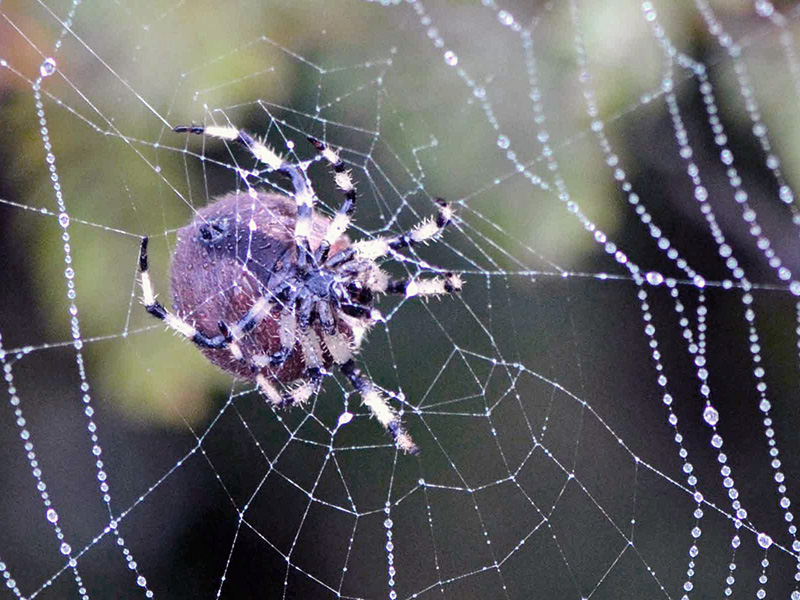
And although they’re NOT insects, we also appreciate the role spiders play in nature.
Our insect visitors
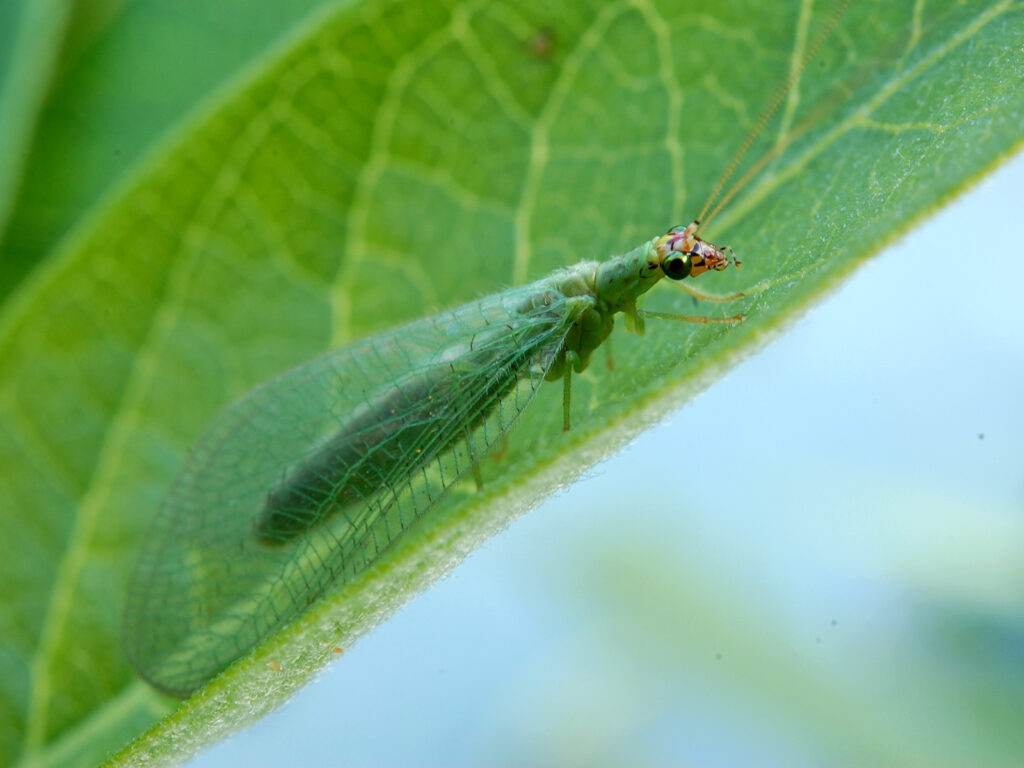
We enjoy seeing lacewings in our garden.
Here are some other insects we’ve seen in our habitat garden:
NOTE: The pages below aren’t yet finished and some of the insects shown will be moved to the proper page.
- Grasshoppers, crickets, katydids (Orthoptera)
- True bugs (Hemiptera)
- Cicadas, hoppers, and aphids (Hemiptera)
- Beetles (Coleoptera)
- Flies (Diptera)
Some of the insects we’ve seen are big enough to be obvious, but we’re rewarded by looking more closely, since many fascinating insects are pretty small. We just have to remind ourselves to look.
Resources
- Proceedings of the Nat’l Academy of Sciences:
- Insect decline in the Anthropocene: Death by a thousand cuts including this excellent graphic showing the many “cuts”:
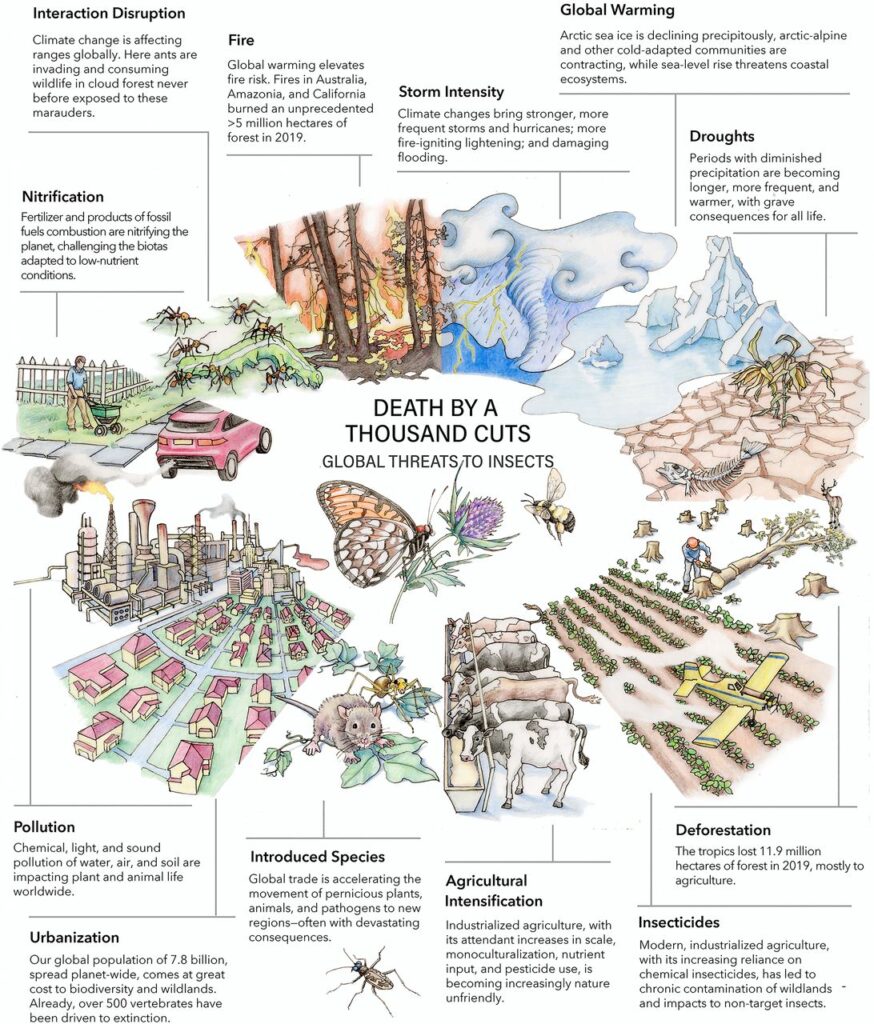
- The Xerces Society:
- Homegrown National Park:
- VIDEO: Why do we need pollinators? – short video by Doug Tallamy
- Native Plant Trust:
- Monarch Joint Venture:
- Cool Green Science:
- Annie White’s Pollinator Gardens:
- Entomology Today:
- NY Times:
- Smithsonian Magazine:
- Yale e360:
- BBC News:
- Heather Holm
- Keystone species and soft landings – Excellent! Include a free PDF handout
- Humane Gardener:
- The value of pollinators: Priceless
- When the rain crow came – Leave tent caterpillars!
- Pollinator Pathway:
- Maine Cooperative Extension:
- Beneficial insects and spiders in your Maine backyard Though written for Maine, the concepts are the same for most places
- Maryland Native Plant Society:
- Can’t identify a bee, butterfly, moth etc.?
- Bugguide.net – An amazing FREE resource for ID’ing insects
- Florida Atlantic University:
- Science Daily:
- PennState:
- TED VIDEOS about “the little things that run the world”:
- Why we all need to learn to love insects – Dave Goulson – 19 min
- Insects are extraordinary. And they may save your life – Sverdrup-Thygeson – 15 min
- Ew to Aww: Your view of bugs may never be the same – Danae Wolfe – 13 min
- Extreme macro photography reveals beauty of the insect world – Levon Biss – 10 min
- Pollination Guelph:
- VIDEO: Spring clean up tips – 4-min Showing (not just telling) how to clean up the yard in an insect-friendly way. (NOTE: She uses Celsius; 15°C=59°F!)
- The Guardian:
- Joe Gardener:
- Coursera :
- Bugs 101: Insect-Human Interactions – a FREE self-paced 13-week online course from the Univ. of Alberta offered through Coursera. Excellent!
- David Suzuki Foundation:
- Grist:
- Washington Post:
- UNC Charlotte Urban Institute:
- Wildflower Center:
- A different light – how insects see plants
Reflections
If human beings were to disappear tomorrow, the world would go on with little change. But if invertebrates were to vanish, I doubt that the human species could last more than a few months.
~ E. O. Wilson
[Regarding E. O. Wilson’s statement that “insects are the little things that run the world”]:
Now there’s a news flash for you. What happened to humans? Don’t we run the world?
To answer these questions would take philosophers and theologians centuries of hotly contested debate, but I can answer the question in one word: No. We certainly might ruin the world, but we do not run it, not by a long shot.
If you would like to test my hypothesis simply answer the following two questions: Can the world function without humans? Can humans function without the world? The answers are so obvious that I will not bore you with their explanations.
~ Eric Grissell, Insects and Gardens, p. 124
If we and the rest of the backboned animals were to disappear overnight, the rest of the world would get on pretty well. But if they [insects] were to disappear, the land’s ecosystems would collapse. The soil would lose its fertility. Many of the plants would no longer be pollinated. Lots of animals, amphibians, reptiles, birds, mammals would have nothing to eat. And our fields and pastures would be covered with dung and carrion. These small creatures are within a few inches of our feet, wherever we go on land — but often, they’re disregarded. We would do very well to remember them.
~ David Attenborough, The BBC’s Life In The Undergrowth
To insist that insects — good, bad, or indifferent — should be banished from the garden is to begin a skirmish that leads to incessant warfare, a warfare that is unwise, unwinnable, and virtually unnecessary … Even if we win the battle in our gardens, we ultimately lose the war for the environment upon which we must all depend.
~ Eric Grissell, Insects and Gardens: In Pursuit of a Garden Ecology, 2001
That gifts were being offered was evident in the general hum and flutter of insect life. The meadow was audible with bees and crickets; the mowed grass was silent. The meadow waved and nodded in the wind; crowds of leaf hoppers leapt to the brush of a hand. The lawn was deadly still.
~ Sara Stein, Noah’s Garden: Restoring the Ecology of Our Own Back Yards, 1993, p. 140
The greater the number of plant species one grows, the greater the number of herbivorous insect species one supports and the more reliable the population of pathogens and predatory insects that control them. Only the scale is different from the game of fox and voles, for ‘habitat’ in the case of a chewing or sucking insect is its host plant — its goldenrod, milkweed, willow, or birch.
~ Sara Stein, Noah’s Garden: Restoring the Ecology of Our Own Back Yards, 1993, p. 112
If, however, all the gardener desires is the presence of pretty little things such as butterflies or what we tend to think of as “good bugs” such as ladybugs, then he may be able to attract them by cunning (for example, nectariferous flowers), but this cunning will have essentially no lasting effect. By virtue of their natural inclinations, insects will need to find sustenance for their offspring; they may pass our way, but they will not stay in our gardens if there is nothing for their young to feed on.
~ , Insects and Gardens: In Pursuit of a Garden Ecology, p. 263
